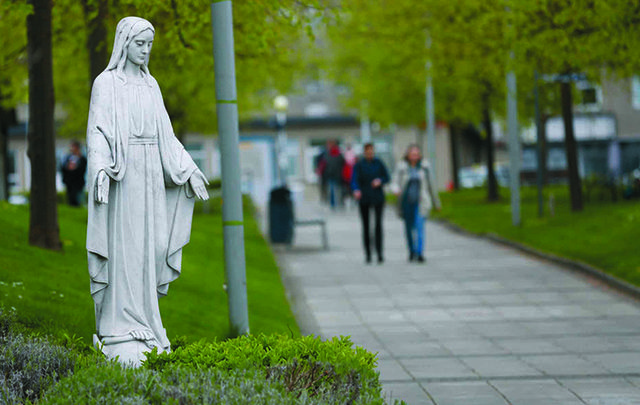Maintaining a religious ethos in a secular culture is a serious challenge, writes David Quinn
If the Fine Gael party were run by people who do not believe in Fine Gael policy, would it still be Fine Gael? Most people would say the answer to this question is No.
Likewise, with the Catholic Church. If it were run by people who don’t believe in Catholic teaching, would it still be the Catholic Church? Outwardly it might seem so, but would it really be true?
The question arises because of a new ruling by the European Court of Justice. This is an EU institution and its decisions are binding on Ireland.
Last week, it warned the Catholic Church in Germany that it could violate anti-discrimination laws if it required employees to be religious.
The Church in Germany is a huge employer. It has 750,000 staff. How can it manage this? It’s because there is a 1% Church tax in Germany, so the main Churches there receive big money.
The court has now ruled that demands for church employees to have a ‘religious affiliation’ should be subject to judicial review. That is, it must be shown that a religious affiliation is relevant to the post in question.
On the face of it, this ruling isn’t necessarily a bad thing. A cleaner in a Catholic hospital or school need not belong to any religion, for example. Their beliefs won’t affect the ethos of their workplace.
The religious affiliation of a clerical worker in a religious organisation probably won’t have any direct effect either.
Mind you, it could be counter-argued that in an ideal world, every employee of a religious organisation would share the beliefs of their employer and reflect them not only in the workplace, but outside of work as well. This is because Christianity is ultimately an evangelical religion. We seek to draw people to the Gospel.
If it is commonplace to encounter people who work for the Church but don’t believe in its teachings, that is likely to have the opposite effect.
To return to the example of Fine Gael, Fine Gael is in the business of increasing its share of the vote. If too many of its staff supported other parties, that would not help it with its goal, to put it mildly.
If Fine Gael party headquarters insisted even its clerical staff were paid-up members of Fine Gael, would that be discrimination? In a way it would be, but on the other hand, there might well be a good reason, such as the one outlined above, as to why Fine Gael would want all its staff to be Fine Gael supporters.
(As a matter of interest, are all Fine Gael staff Fine Gael supporters? Is it a requirement of employment? It would be useful to know.)
In any case, following the ruling of the European Court of Justice (ECJ), the various Churches can no longer enforce this requirement.
Very well: we are forced to accept that the cleaning and clerical staff don’t have to share the religion of their employer. But what about the doctors and nurses in a Catholic hospital, or the teachers in a school? Surely that is more relevant?
For example, a Catholic hospital will obviously be pro-life. That is to say, it will never kill the unborn, the old or the infirm in the name of ‘choice’. What happens if a doctor or a nurse happens to think otherwise? Obviously, they won’t be able to act on their beliefs in a Catholic hospital. They will have to go elsewhere.
The trouble is that over time, if too many doctors and nurses feel this way, it will begin to erode the ethos of the hospital.
Suicidal
We can already see this happening in Ireland, for example. When the so-called Protection of Human Life During Pregnancy Act was introduced in 2013, two Catholic hospitals, the Mater and St Vincent’s, both said they would obey the law even though it authorises abortion in cases where a woman is deemed to be ‘suicidal’.
Why did they do this? Was it because a lot of their doctors agree with that law and it was too difficult to resist them?
We saw recently in Belgium that a group of Catholic nursing homes said they would be willing to carry out euthanasia. This is what happens when you employ too many key personnel who do not believe in your ethos – you lose your ethos.
The ECJ ruling still allows religious employers to tell their employees to “refrain from anti-Church behaviour” such as promoting abortion or racism. This would allow them to dismiss a doctor who was publicly campaigning for abortion.
But suppose that same doctor was divorced and remarried? It seems the employer could do nothing about that, unless perhaps the doctor was to start publicly attacking the Church’s position on divorce and remarriage.
What difference does the ECJ decision make to Ireland? Probably not much because the ability of religious employers to uphold their ethos has been attacked on every side anyway.
For example, Catholic schools already employ many teachers who don’t believe in Catholicism. The same goes for Catholic hospitals. These employers, legally speaking, can really only act against those employees if they begin to publicly contradict their employer’s ethos, or do so in the workplace.
In any case, even if Catholic schools and hospitals were perfectly free to employ only practising Catholics, they would be hard-pressed to find them in sufficient numbers.
The sad fact is that it is hard to maintain the Christian ethos of large Christian organisations when the societies in which they operate are becoming more and more secular.


 David Quinn
David Quinn
